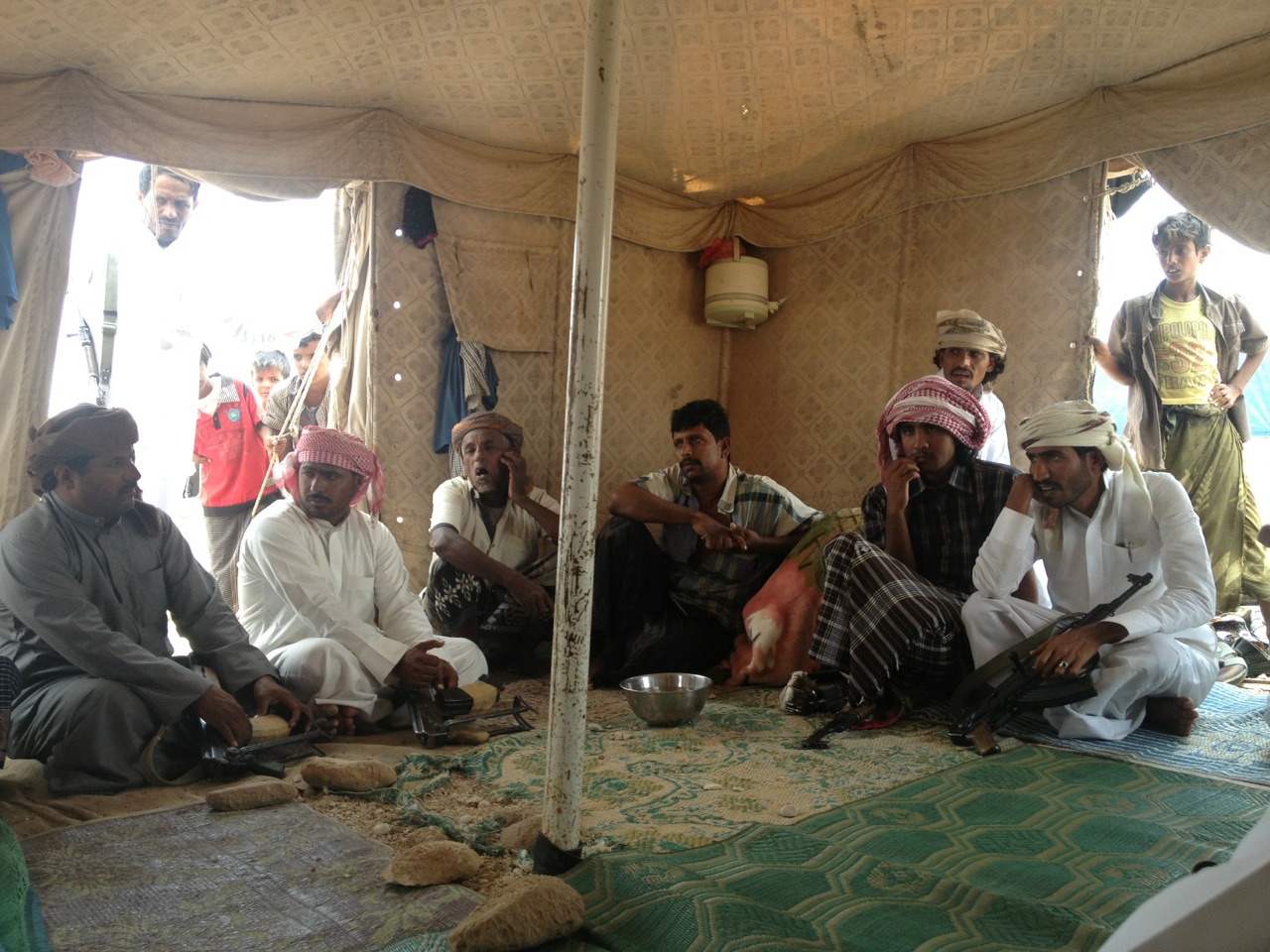Elisabeth Kendall, senior research fellow in Arabic and Islamic studies at Pembroke College, Oxford, recently travelled to Yemen’s remote and dangerous Mahra region to carry out the first ever survey of the local people’s hopes, fears and political aspirations in post-revolution Yemen.
There she spoke with tribal leaders about the threat to the region from al Qaeda fighters, met tribesmen trying to combat gun and drug smugglers, and heard of plans to pipe the region’s limited water supply to Saudi Arabia.
This is the first in a series of blogs written for the Thomson Reuters Foundation recounting her journey and is reposted here with permission.
 A long row of armed tribesmen came into view as we rounded the first corner beyond Oman’s border fort and entered eastern Yemen. We had crossed into the little known land of the Mahri tribes.
A long row of armed tribesmen came into view as we rounded the first corner beyond Oman’s border fort and entered eastern Yemen. We had crossed into the little known land of the Mahri tribes.
As we approached the terrifying line of flowing robes and colourful headdresses, my eyes were drawn to their glinting Kalashnikovs. They sported these as naturally as they did the traditional daggers lodged in their leather belts.
My palms sweated as I remembered why it was that Yemen, and in particular this remote eastern wilderness, featured as one of only three places on Earth that the British Foreign Office advised absolutely no travel.
So it was with considerable relief that I heard the traditional Arabic greeting: “Peace be upon you”. Without the greeting, in this corner of Yemen, the assumption is that peace is not intended. In fact, the waiting tribesmen were to be my guard for my forthcoming travels around the breathtakingly beautiful deserts, mountains and wild coastline of Mahra.
I and the four men who had brought me to Yemen, each the son of a prominent Mahri sheikh, made our way solemnly along the line. The men kissed and rubbed noses. I simply shook any hand I found outstretched. Not many.
 The mood was solemn and almost silent. The group argued in low voices about who should kick off the traditional greeting ritual, each deeming himself too humble for the task. Until now, I had always believed that the British had a monopoly on insistent modesty.
The mood was solemn and almost silent. The group argued in low voices about who should kick off the traditional greeting ritual, each deeming himself too humble for the task. Until now, I had always believed that the British had a monopoly on insistent modesty.
Finally, Sheikh Rashid stepped forward. At over six feet tall, he carried two guns and a dagger and I knew he was a bit of a legend among the tribes of the northern deserts for his warlike acts.
He shattered the silence. “Khubuur!” (“News!”). It was more a command than a question. A chorus of voices replied: “Khubuur khayr” (“The news is good”).
There followed a huge din as everyone launched at once into the stock questions: “How are you? How is your family? How is your health? How are your circumstances?” And the equally predictable answers: “Allah be praised! Allah is all-giving! May Allah bless you!”. Everyone spoke at once. It was a terrific ice-breaker.
 With this ritual over, the men jumped into the waiting land cruisers. I was crammed into the middle back seat, surrounded by four guns. We were off, leaving the smooth border road to take a rocky dirt track up into the hills for my first meeting, away from prying eyes.
With this ritual over, the men jumped into the waiting land cruisers. I was crammed into the middle back seat, surrounded by four guns. We were off, leaving the smooth border road to take a rocky dirt track up into the hills for my first meeting, away from prying eyes.
I noticed that my companions too now carried guns that had miraculously appeared from somewhere. Sheikh Rashid explained: “We keep our guns in a friendly kiosk, just over the Yemeni border. When we arrive from Oman, they are delivered to us. When we leave, we drop them off again, just before we cross the border back to Oman.” He made it sound as casual as dropping off a rental car.
My companions were clearly relieved. Each of the main three tribal alliances had contributed to the protection convoy. All were keen to support my survey of the hopes, fears and aspirations of the Mahri tribes. Foreigners in Yemen often make the mistake of paying for protection. But here, the most effective deterrent is to secure an oath of allegiance from the tribes.
If anything happened to me now on their watch, it would be a huge dishonour for their tribes and one that they would have to avenge. All Mahris, indeed all Yemenis, understand this. Even the growing number of Somalis who now populate the Mahri coast know to keep their distance.
Muhammad (not his real name), a quiet but hugely charismatic sheikh, for whom the group always fell silent, explained:
“You British really don’t understand. Security is quite simple. When Somalis captured one of our cargo ships, we flew an old Russian plane with several members of our tribe into Somalia to find them. We bundled their headman back to Mahra and sent the message that he would be beheaded unless they released our ship. So: they released our ship, we released their headman. No blood was shed and we have encountered no further trouble.”
I tried to imagine how British diplomats would react to such a suggestion.
This post was first published by the Thomson Reuters Foundation.








No Comment